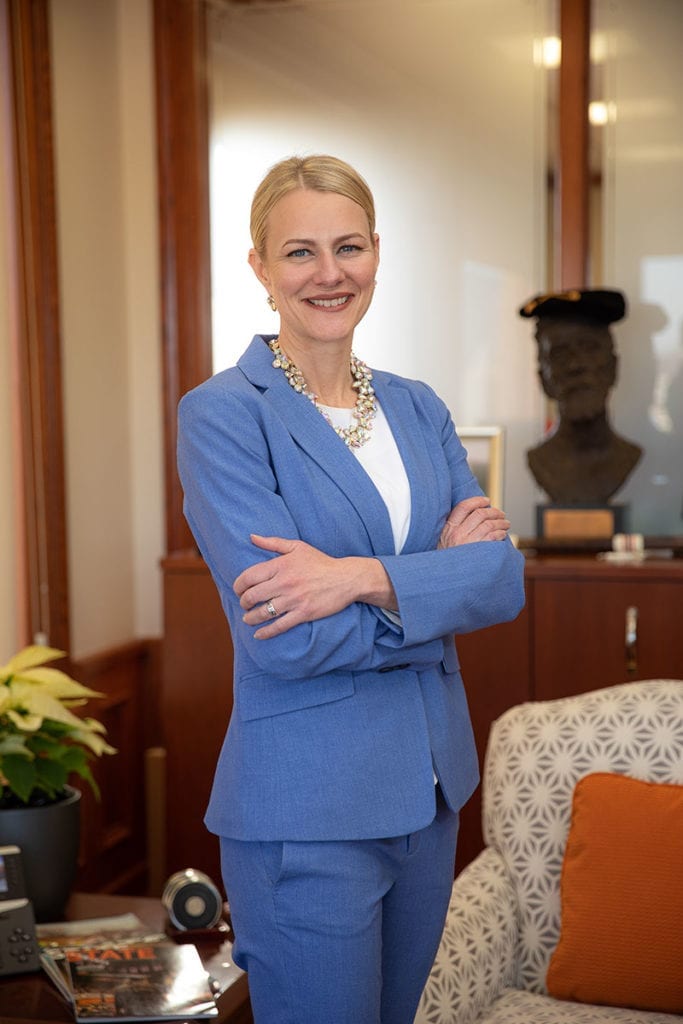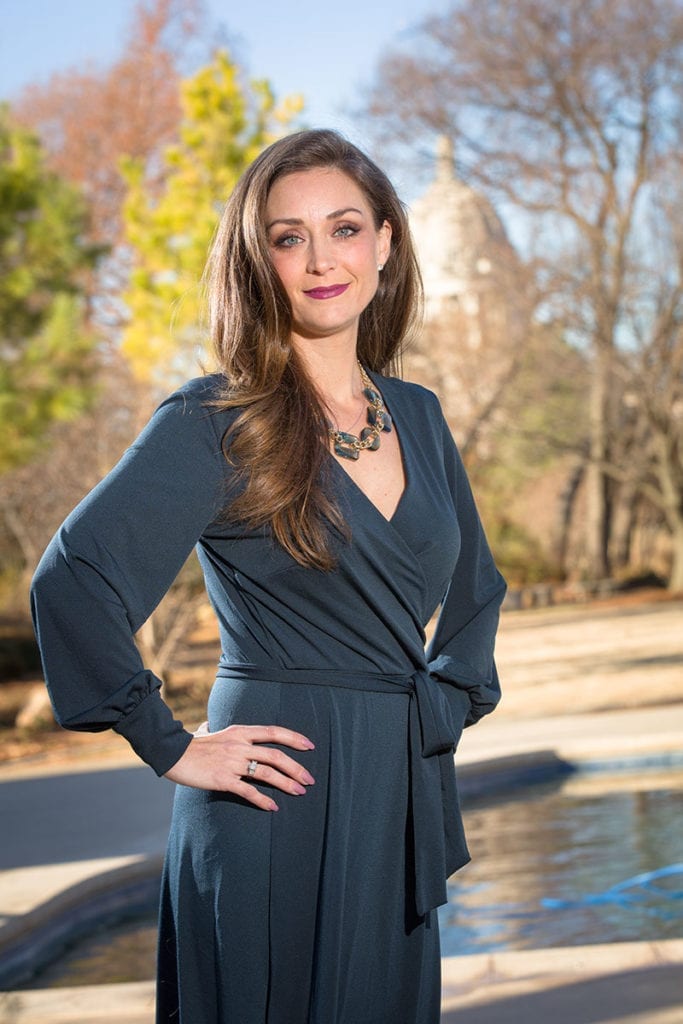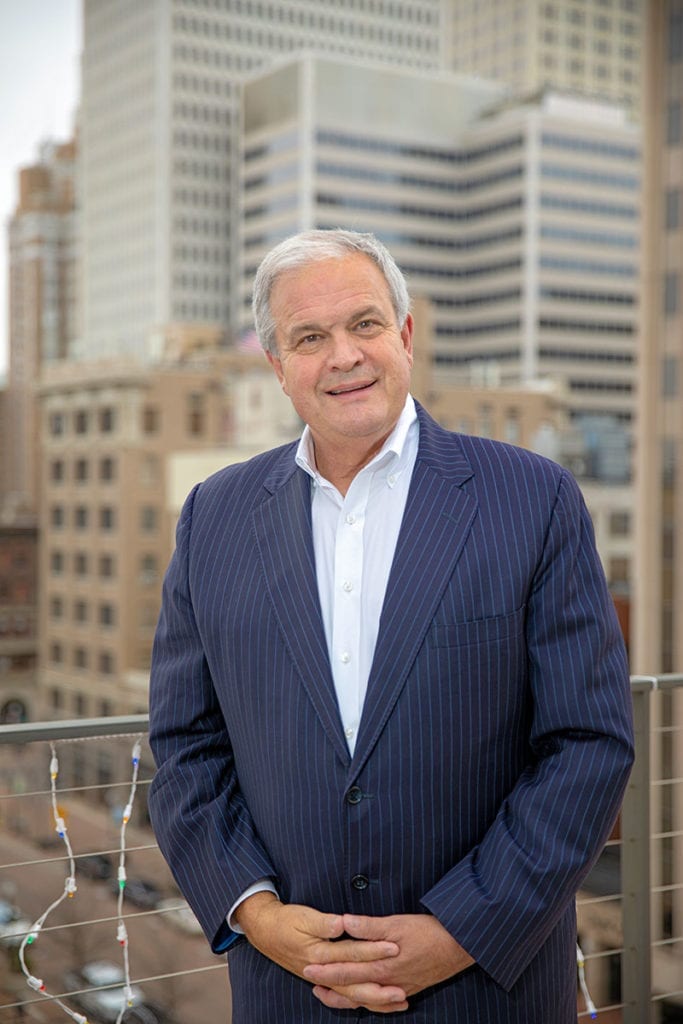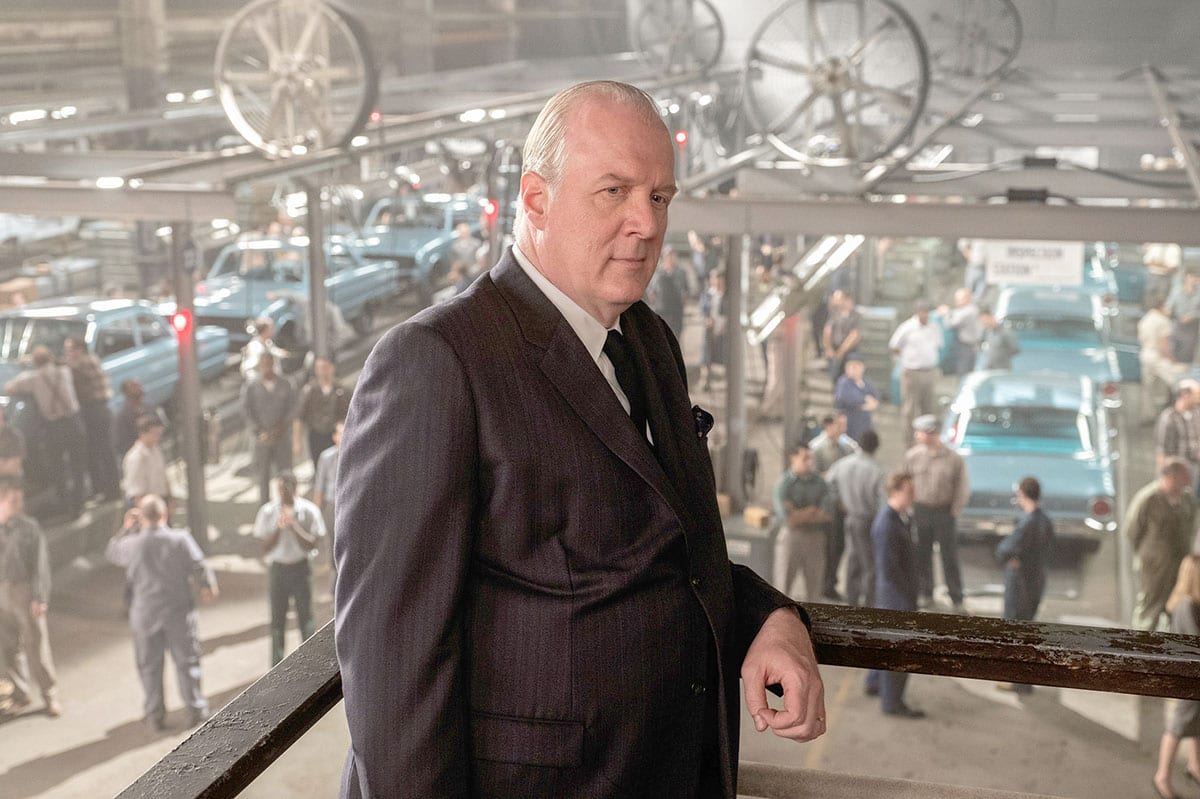Tracy Letts
The acclaimed actor-playwright-screenwriter has roots in the state … and he wants his young son to appreciate them.
Tracy Letts hasn’t been back to Oklahoma from New York as much as he’d like in the past few years, but that will soon change.
His son, Haskell Letts – named for a grandfather named for Charles Haskell, Oklahoma’s first governor – is the first child born into his family in more than 50 years. The author, screenwriter and actor wants his son to experience life in Oklahoma, whether it’s appreciating the state’s great artists, hanging out with Letts’ brother in Wagoner or fishing for crappie in Lake Eufaula.
Letts, who won a Pulitzer Prize for Drama in 2008 with his play August: Osage County, opens his latest work, The Minutes, in March.
“It’s about the system by which we conduct our politics, and it’s addressing some of the original sin of being an American and how we got here, so there is a Native American theme,” he says. “It’s a 1½-hour comedy, a look at a city council meeting set out in real time in a small-town, fictional setting.”
People might assume it was influenced by the 2016 presidential election, but Letts says he was “already writing the play and was nearly done when the election happened. I had to keep my blinders on to finish the play I set out to write.
“If everyone walked out [at the end of the play] talking about personal responsibility – how they’d like to conduct themselves in our country and our society – it will more than do its job.”
Letts grew up in Durant; his parents were professors at Southeastern Oklahoma State University. There was a premium on the written word and his childhood was filled with books, movies, television and lively critical discussions.
“It was a place of very fertile imaginations and curious minds,” he says. “Education was the path for both of [my parents], and the way they got out of the cycle of poverty in their families. My parents hoped that we’d find things in our lives about which we could feel passion … and we did.”
Letts’ parents retired from teaching while in their 50s and went on to successful second careers: Dennis as an actor and Billie as a novelist.
“If you wanted to foster a sense of artistic ambition in your children, I can’t imagine there is a better way to go about it,” he says. “They were delighted if I was doing something that I loved.”
When in Tulsa, Letts likes to grab a burger at Claude’s on Brookside or explore the Woody Guthrie Center. He plans to visit the Gathering Place on his next trip. Encouraged, Letts focuses on Oklahoma’s future.
“I was so proud when I saw how many teachers fought for change” in 2018, he says. “Support those teachers – they are raising your kids. If you want the next Pulitzer Prize winner to come out of Oklahoma, they will need a good education.”
– TL

Alfre Woodard
This star of stage, screen and TV takes the ideals she learned during her Oklahoma upbringing and helps to improve the world.
Critically acclaimed actor Alfre Woodward, with a new movie and Apple TV series, never forgets her Oklahoma origins.
“Whatever your beginnings, they are your roots. My roots were nutritious roots,” says Woodard, a graduate of Tulsa’s Bishop Kelley High School who studied drama at Boston University and made her theater debut in 1974. “That 17 years in Tulsa was my launch.”
Woodard takes pride in her family’s history in and deep connections to the state. On her dad’s side, one of Woodard’s once-enslaved ancestors went to South Texas, then to Oklahoma Territory in the late 1800s.
“My father’s people grew up owning land,” she says. “They did well during the Great Depression. As a boy, my father was helping pass out food to men he called hoboes. His mom told him those weren’t hoboes; they were someone’s father, brother, son.”
Such lessons about treating people with respect were integral to Woodard’s formative years.
“In Oklahoma, if someone’s family crop doesn’t come up, you help them. The land was a great equalizer,” she says. “The lesson is there is no difference between people.”
When she was 5, Woodard recalls her father teaching her that as a citizen of the world, she had a right to be out in it. Woodard took that to heart; her career includes more than 100 film and television projects, a Golden Globes victory, four prime-time Emmy Awards, eight NAACP Image Awards, three Screen Actors Guild Awards, numerous other nominations and induction into the Oklahoma Hall of Fame in 2014.
When deciding on projects, Woodard considers her ability to bring something new to a part.
“Something organically takes hold,” she says. “I only go to work when I can think of something to do with this character that someone may not think of. I’m over 60, educated, traveled. I’ve seen the world, from squatter camps to palaces. I have a real store of experiences I can draw from.”
She’s in one of Apple TV’s inaugural shows, See, set in a dystopia where all humans are blind. In the movie Clemency, which opened in December, she plays a prison executioner.
“It’s a story that belongs in the population’s conversation,” says Woodward, who toured U.S. prisons to prepare for the part. “We’ve never looked at the lives of the people that we charge with carrying out the sentences.”
On being named one of People magazine’s Most Beautiful People in the 1990s, Woodard says the acknowledgment “gave little brown girls a booster. They can walk a little straighter. Everybody’s face is intricate and a work of art.”
Known for her activism spanning many causes, she focuses now on criminal justice and the Children’s Defense Fund.
“Oklahoma people would give you the shirt off their backs,” she says. “I took that into the world. We have to catch that same spirit.”
A California resident, Woodard spent Thanksgiving with about 40 family members and christened her niece’s new Tulsa home. She has dozens of cousins in Texas and Oklahoma and has two grown children, Mavis and Duncan, with her husband, Roderick Spencer.
“My children have taught me so much,” she says. “If you’re really alert, you learn from watching your children grow. I’m grateful to witness the kind of people they’ve developed into. It’s the most glorious and important thing I will ever do.”
– CB

Kayse Shrum
A country girl at heart, the president of OSU’s Center for Health Sciences recruits students who understand the importance of the state’s rural areas.
Kayse Shrum understands rural Oklahoma because she grew up, and still lives in, the country.
That’s why May’s historic groundbreaking of the Oklahoma State University College of Osteopathic Medicine at the Cherokee Nation gave the president of the OSU Center for Health Sciences personal satisfaction.
Shrum says establishing the nation’s first tribal medical school built on an alliance “that OSU has long had with the Cherokee Nation. We understand the tribe’s culture because we’ve done clinical rotations with our medical students in the Nation for years.”
The Tahlequah facility “fits with our mission to improve the lives of rural Oklahomans and gives them access to primary-care physicians. Less than .4% of medical students across the country are Native Americans, so this was a natural partnership.”
Shrum and the Cherokee Nation also work together on Operation Orange, which exposes rural high schoolers to what medical school is like. This, too, reflects part of Shrum’s life.
“A college professor suggested that I consider applying to medical school,” she says. “I hadn’t even thought of that. Later, I realized that where I grew up, there are a lot of smart students who don’t consider medicine as a career.
“And that’s what Operation Orange is about: taking people from the medical school out to rural students and showing them they can do this.”
Shrum also appeals to FFA and 4-H students with a mentoring and scholarship program called Blue Coat to White Coat. She says these agriculturally minded young people make ideal physicians because “they are hard-working, service-oriented and bright. They understand the importance of rural areas to Oklahoma and the nation. They understand our mission. They get it.
“We want them to go back as doctors and become leaders in their communities.”
A pediatrician who graduated from the medical college she now oversees, Shrum, in 2013, became Oklahoma’s youngest person (at age 41) and first woman to become president of a health science center and dean of a medical school.
Shrum says her management style derives from doctoring children.
“Watch and wait is a prime directive for pediatricians, who always have to be patient,” she says, “and that helps in leadership. Sometimes you have an idea, but you have to wait for the right moment to happen. I chose pediatrics because I wanted to partner with parents and see kids in Oklahoma thrive, so I know how to collaborate.
“As a pediatrician, you have to be a good communicator and a good listener. It’s important for people to know they’re being heard. And you want to have a positive interaction with everyone.”
In May, Gov. Kevin Stitt appointed Shrum secretary of science and innovation. In that position, she wants Oklahoma to become a research hub and “use science to grow industries from the ground up.”
Shrum drives into Tulsa from Coweta, where she was raised and lives with her husband, Darren, and their six children. Three are from Ethiopia; the Shrums adopted them when they were 10, 12 and 13, respectively.
“They have changed our family’s perspective on life,” she says.
– BW

Pat Crofts
This gaming veteran has persevered in the casino industry, including the flooding that closed the Muscogee (Creek) Nation’s gem for a month.
In his nearly half-century in the casino industry, Pat Crofts has encountered mudslides, blizzards and monsoons at premier gaming venues across the globe – from Lake Tahoe in the Sierra Nevada to Macao on the South China Sea.
With those experiences in mind, the CEO of Muscogee (Creek) Nation Casinos says the Arkansas River flooding the River Spirit Casino Resort in May ranks as “one of the top five challenges that I’ve ever faced because of the cost and the time frame” of getting the Tulsa entertainment hub back to business.
“I’ve built and opened hotels all over the world, but that’s over a year or two,” Crofts says. “Here, we had to do it quickly. It was a race against the clock.”
High waters from record rains closed the facility from May 22 to June 21.
“We had four hours to get air conditioning up to all [438] rooms to keep out mold,” Crofts says. “We brought in three remediation companies and had 19 semi-trailer truckloads of air-conditioning units throughout the hotel within 48 hours of having our power cut.
“Once the water went down, we had a tremendous cleanup. We had 500 more workers from the remediation companies. We had an industrial hygienist on-site and we took it area by area. The water was mostly below the casino and hotel. On the lower levels, we had to take everything down to concrete and metal studs.”
Crofts says River Spirit “lost a large amount of money every day that it was closed,” yet kept paying 1,600-plus workers – a $2.5 million payroll while bringing in zero revenue.
“It wasn’t our employees’ fault and many had flood issues themselves,” Crofts says. “It was the right thing to do. A lot of our employees don’t have the resources to be out of work.
“Many people, since we reopened, have patronized our casino because they found out that we supported our employees. One couple were at a casino in Arizona and drove here when they learned what we did.”
Crofts says many River Spirit employees volunteered to clean up “and worked until we had to send them home after being here 12-14 hours a day.”
Crofts, a native of Panguitch near Bryce Canyon in southern Utah, got his start in the industry after graduating from Weber State University in 1973.
“Deloitte offered me an accounting job with a choice of either working in Las Vegas or Los Angeles,” he says. “Well, that was an easy choice for a guy just out of college.”
Deloitte, at the time, handled the accounts for Howard Hughes, the reclusive industrialist who owned 15-20 casinos.
Crofts rose through the ranks and eventually opened world-class casino resorts for Harvey and Harrah’s. The Muscogee tribe hired him full time in 2011 to oversee River Spirit’s expansion, which included the 27-story tower, Jimmy Buffett’s Margaritaville and Ruth’s Chris Steak House.
Crofts sees managing people as “a team situation, a collaborative effort. I had mentors while I was coming up and the successful ones weren’t tyrants. I remember a food-and-beverage director whom everyone called Coach because he would coach, not boss, his employees.”
– BW

John T. Nickel
This plant-growing entrepreneur, conservationist and philanthropist bought thousands of acres of wilderness – then gave it to The Nature Conservancy.
John Nickel’s passion for nature began at age 10, when his dad took him and his brother on an Illinois River camping trip. The Muskogee native has often gravitated to those Ozark hills and into the river.
“Back in those days, the country was undeveloped, pristine,” he says.
With parents who owned a Muskogee landscape nursery, Nickel grew up in the business. He saw California nurseries growing plants in containers, but no one else was really doing that. As a young entrepreneur, Nickel wanted a wholesale nursery, with the United States as his marketplace.
He took that California idea and established Greenleaf Nursery near Lake Tenkiller at age 22. Nickel mentions the company is one of America’s largest wholesale container-growing nurseries, with additional locations in Texas and North Carolina. Greenleaf “ships everywhere in the U.S. and Canada east of the Rockies,” he says.
In another connection to California, Nickel’s brother revitalized Far Niente Winery, established in 1885 but put out of business by Prohibition. In 1979, the brothers began restoring Far Niente’s historic building, vineyard and winery in Napa Valley. Their efforts resulted in placement on the National Register of Historic Places.
Nickel’s sense of conversation came when he attended Connors State College in Warner. He took a class field trip to “a large cattle ranch in Cherokee County along the Illinois River to observe the results of chemically killing trees to allow more grass for grazing. I didn’t think I would ever have such a place, but I wanted to have [it] to make a nature and wildlife preserve.”
In 1989, Nickel bought those beloved 14,000 acres, which gave rise to his J-5 Ranch. He donated it all to The Nature Conservancy in 2000. As the Ozarks’ largest privately protected conservation area, the J.T. Nickel Family Nature and Wildlife Preserve comprises 17,000 acres.
The Nature Conservancy restores and maintains the preserve, and offers the public opportunities to enjoy the breathtaking area.
“I love the beauty of unspoiled nature and want some to remain undeveloped for future generations to see,” Nickel says.
– CB

Sarah Stitt
Oklahoma’s first lady fights for the marginalized and advocates for better mental health resources.
Sarah Stitt channels a famous literary character as she advocates for Oklahomans caught in whirlpools of imprisonment, addiction, mental illness and other devastations.
Atticus Finch, in To Kill a Mockingbird, says, “You never really understand a person until you consider things from his point of view … until you climb in his skin and walk around in it.”
As Oklahoma’s first lady, Stitt tries to live those words – seen in helping 527 inmates, recently released with commuted sentences, reenter society “with a helping hand up, not just a pat on the back.”
“You can’t pick the position you were born into,” Stitt says. “I could have easily been in their situations. Each of those I met, with just a little tweak here or there, wouldn’t have ended up in prison. Any of us could be just a few circumstances away from this.”
After state question 780 turned a host of property and drug felonies into misdemeanors, House Bill 1269 made the law retroactive, so a record number of convicts left prison Nov. 1. Stitt told many officials that merely sending commutees into the world was not enough.
“I just said, ‘Hey, this isn’t going to work. You can’t let people fall back into the same problems,’” Stitt says. “The nonprofits, the business community, government agencies, the pardon and parole board, the prison system – everyone – made it work.
“Even up to the day of the commutations, I had texts from businesses and nonprofits wanting to help.”
Stitt also fights for people with mental illness. Candid about her family members’ battles with addiction, depression and other issues, Stitt says education and childhood treatment are keys in addressing problems that shatter lives.
“We can keep people from the ledge instead of waiting to help them when they’re on the ledge,” says Stitt, who encourages all Oklahomans to support each other. “It’s one life at a time, one family at a time. There is hope for the future in our state.”
– BW

Stuart Price
This developer and his family focus their business on reinventing Tulsa and creating stunning places for Oklahomans to live and work.
In 1979, Stuart Price and his wife, Linda, arrived in Tulsa. The Denver native says they stayed because the couple “found an incredible community in Tulsa and Oklahoma, which was kind and inviting.”
A graduate of the University of Tulsa College of Law and a member of the Oklahoma Bar Association, Price has a résumé that includes a long tenure in the oil and gas industry and nine years with the Oklahoma State Regents for Higher Education.
In 2011, Price embarked on a mission to revitalize downtown Tulsa. With his wife and their four children at the helm, Price Family Properties now claims half of the central business district and manages more than 2 million square feet of commercial office space. Many of the acquisitions occurred in 2017, when Price bought Maurice Kanbar’s portfolio of historic downtown buildings.
“It’s turned into a passion,” he says. “We believe we are stewards of these historic structures to prepare them for the next generation of use.”
A hotbed of Art Deco architecture, Tulsa became the Terra Cotta City in the early 20th century, partly because of Waite Phillips. One of Price’s favorite buildings is the Philcade, which still has the initials WP on all the doorknobs from when the oil tycoon opened it in 1931. Price, whose first name is William (another WP), says it’s surreal that he now owns the building.
Fond of quoting Phillips, Price says, “The only things we keep permanently are those we give away.”
That mantra rings true in Price’s philanthropy, including involvement with the Gathering Place and the Tulsa Achieves scholarships at Tulsa Community College. He says more than 20,000 students have received them.
In the next 10-15 years, Price foresees a “downtown Tulsa not seen since the 1920s – entertainment, apartments, arenas – bubbling with people and energy.”
Price also says he values a strong work ethic: “My dad always said, ‘Son, you can do anything you want. You just can’t do it on the couch.’”
– CB























